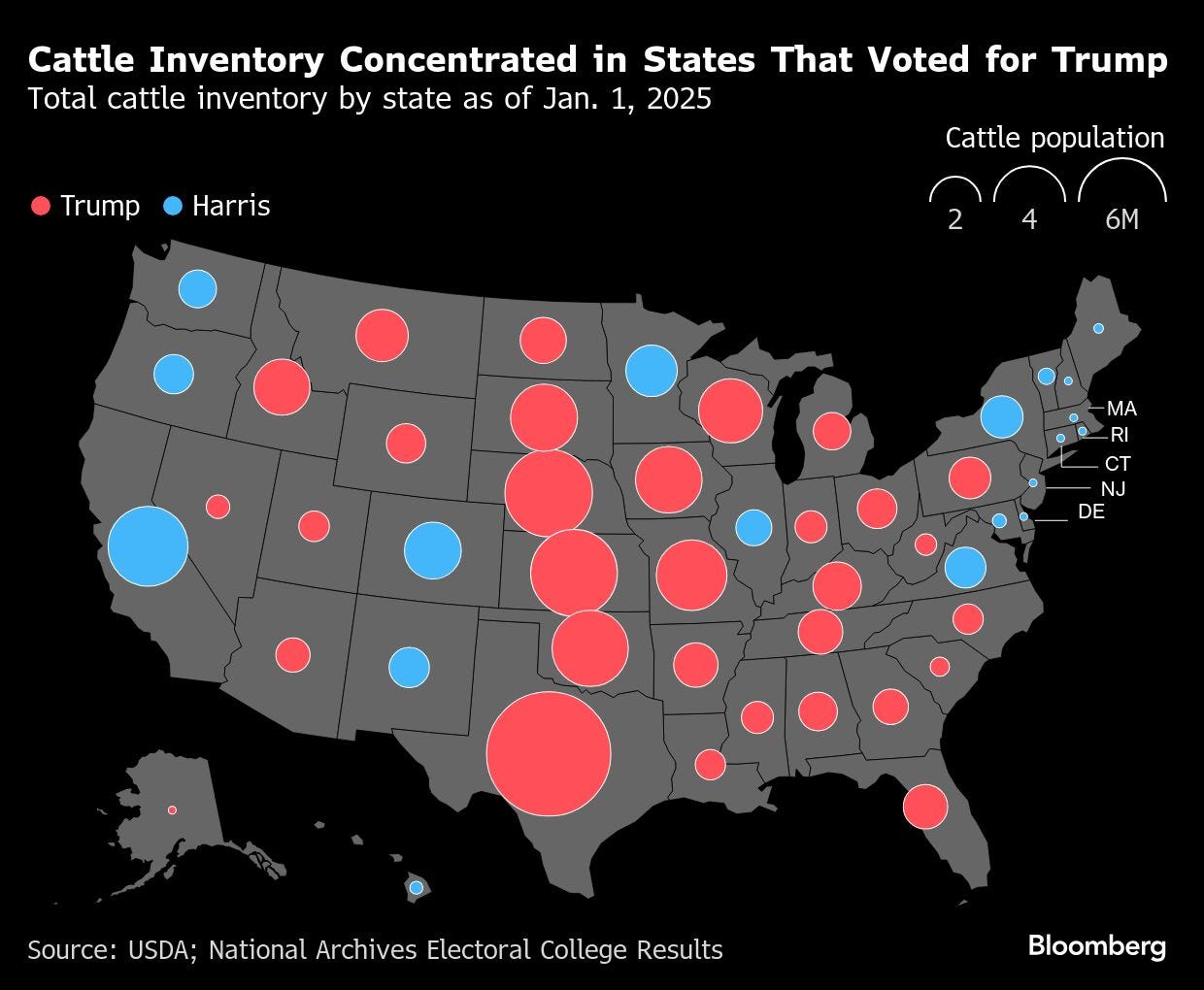President Donald Trump has hit upon an issue that triggered some rare complaints from congressional Republicans: beef.
Farm-state Republicans, who represent most of the nearly 1 million cattle-ranch owners in the US, have criticized the president’s decision to quadruple the tariff-free quota on Argentine beef as counter to the America First agenda he’s long championed.
“The economics in rural America right now is not sustainable,” said farmer and former Montana Democratic Senator Jon Tester. The Argentine beef deal just “adds to that unsustainability across the board.”
Their general worries about trade may have been eased slightly by the framework of a deal Treasury Secretary Scott Bessent announced on Sunday in Asia in which China would make “substantial” soybean purchases after it had paused such buys as part of the trade war with Trump, also worrying farmers in Republican states.
Caleb Ragland, the president of the American Soybean Association, called it a “positive step.”
Last week, when Argentine President Javier Milei visited Washington, Trump suggested buying more beef from the South American nation to help push down US beef prices.
“We would buy some beef from Argentina,” he told reporters. “If we do that, that will bring our beef prices down.”
Beef prices have hit record highs this year, according to data from the Bureau of Labor Statistics,fueled in part by depleted herd counts and steady demand from U.S. consumers.
The political stakes are high for the GOP heading into next year’s midterm elections, where any Democratic pickups in Republican districts and states would threaten the party’s hold on power in Washington.
Republicans have a firm grip on middle America that has only tightened during the Trump era, as evidenced by Tester’s loss after three Senate terms. But anxiety among farmers and ranchers could make some districts more competitive, forcing Republicans to spend money and time on races they hadn’t planned to before. It could also cost Republicans lucrative donations.
The National Cattlemen’s Beef Association donated nearly $1 million to Republicans in the 2024 election cycle. The group, which has primarily given to Republicans since significantly stepping up its political donations in 2012, swiftly condemned Trump’s move, calling it a “misguided effort” that would hurt American farmers and ranchers.
Senate Majority Leader John Thune said Trump’s maneuver “isn’t the way to do it.”
“It’s created a lot of uncertainty in that market. So I’m hoping that the White House has gotten the message,” Thune said last week.
Cattle outnumber people in nine states, including Thune’s home state of South Dakota, as well as Montana and Nebraska, according to a National Beef Wire analysis of USDA data.
Beef is “hugely important” to cattle-dominant states and the agriculture industry in general, said Elliott Dennis, an associate professor at the University of Nebraska-Lincoln. Livestock receipts make up about half of all farm receipts, and this year as much as 85% of those will be from beef, Dennis said.
Trump, however, has only doubled down on his position, saying that cattle ranchers “don’t understand” that his tariff policy has benefited their industry and telling them they need to bring their prices down.

Cattle ranchers have already faced a slump in recent years, with cattle inventory hitting the lowest point in decades in 2024. All the while, beef costs shot up 13.9% in the August consumer price index report, while food prices in general rose 3.2% over last year.
“The answer is let the markets continue to recover,” Montana Republican Senator Steve Daines said, adding that ranchers are “finally getting to the point where they’re making money again and they’re very concerned about these actions.”
The Agriculture Department on Wednesday released a plan to encourage ranching and boost domestic beef production, including making it easier for ranchers to graze cattle on federally owned land, increase insurance subsidies and slash costs for small processors.
But it did little to contain the political fallout from Trump’s announcement.
US Trade Ambassador Jamieson Greer said that his phone was filled with calls from Republican lawmakers concerned about the proposal, but he stressed the influx of Argentine imports wouldn’t flood the beef market as ranchers feared.It would take at least two years for Argentina to ramp up its own beef supply, said Adam Murray, a beef cattle extension specialist at Cornell University, making it difficult to overpower domestic beef in the short-term.
But Murray also acknowledged that Trump’s move is nonetheless a risky one from a political and public relations perspective.
“Executive statements like this create the psychology that the administration does not support US cattle producers,” Murray added.
© 2025 Bloomberg L.P.